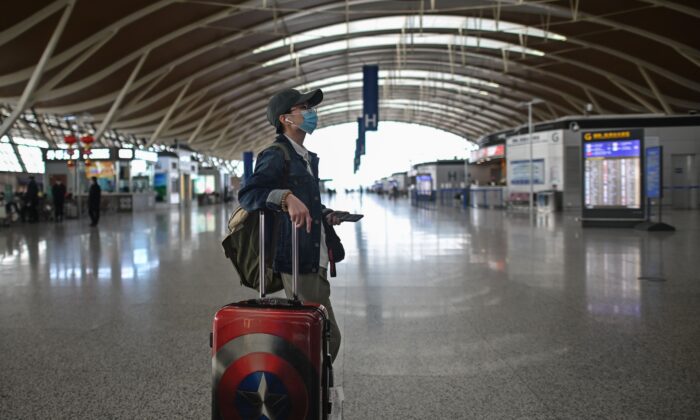US Ambassador Calls on Countries to Release Religious Prisoners Amid Pandemic
Beijing suddenly cancelled most of the international flights into China beginning on March 29, causing many overseas Chinese to get stranded on their return trip.
Some were stuck in the airport where they had layover flights, unable to catch a plane to their home country.
The United States, UK, Australia, Japan, and other governments evacuated their citizens from Wuhan, China’s epidemic ground zero, soon after Wuhan authorities locked down the city on Jan. 23.
Chinese authorities, on the other hand, did not offer such assistance.
Chinese social media were filled with messages from stranded Chinese citizens, including those who went abroad for business trips, tourists whose travel plans were disrupted due to the pandemic, and youth studying abroad who wished to return to China.
Beijing’s actions were criticized by Chinese people.
Stuck Overseas
“Chinese Embassy, we want to go home!” about 30 Chinese shouted slogans outside the Chinese embassy Kathmandu, Nepal on March 30.
Chinese portal website Sohu reported on March 31 that these Chinese protesters did not know each other, but convened after seeing social media posts about plans to gather at the embassy.
“Some of them are tourists,” according to the report. “Some of them have spent all their money.”
On the morning of March 30, Chinese netizen QQ Naicha Qifentang Shaobing posted on Weibo—a Twitter-like social media—that she was stuck in Addis Ababa, Ethiopia, along with almost 300 Chinese students. All of them were transferring flights there, but their connecting flights were cancelled following the new rule.
“Some students have been stuck here for three days,” QQ Naicha said. “Flights were cancelled again and again… We are on the verge of a psychological breakdown… Our parents in China are [going] crazy [due to concerns about their whereabouts].”
QQ Naicha goes to school in Kansas City area in the United States. Another student surnamed Hu who is studying at Pennsylvania State University said she had a similar experience.
“Ethiopian Airlines applied for permits for three different flights to China, but was refused [by Chinese authorities]. We are continually waiting here for updates,” Hu said in a video shared on Weibo.
The students’ situation was confirmed by the Chinese embassy in Ethiopia. State-run Global Times quoted staff from the embassy, saying that Chinese authorities approved a flight from Addis Ababa to Shanghai on March 30. All students were arranged to take this flight.
New Rule
On March 26, China’s Civil Aviation Administration announced a new rule to limit flights into China, explaining that it wished to prevent imported cases of CCP virus infections.
For foreign airlines, each company can only have one flight into China every week. For Chinese airlines, each company can have one flight from each country where they operate flights into China per week.
For all flights to China, airlines can only sell 75 percent of tickets, to ensure social distancing.
The United States, Australia, Singapore, Philippines, Italy, Spain, and dozens of other countries banned all commercial passenger flights to China since February, after the CCP virus outbreak became severe in China. Some Chinese nationals who wished to return to China thus encountered difficulties.
On April 2, Ma Zhaoxu, China’s deputy minister of foreign affairs, said at a daily press conference that there were also stranded Chinese citizens in Bangladesh, Cambodia, and other countries.
Ma said 1,457 of them have returned to China, including the students from Ethiopia.
China’s Ministry of Education announced on March 27, 2019 that 662,100 Chinese students studied overseas in 2018, 8.83 percent more than the year prior.
Authorities have not yet released data for 2019. Chinese portal website Sina estimated on Jan. 3 that the number of overseas Chinese students for 2019 should be higher than 2018.
The Epoch Times refers to the novel coronavirus, which causes the disease COVID-19, as the CCP virus because the Chinese Communist Party’s coverup and mismanagement allowed the virus to spread throughout China and create a global pandemic.
This article is from the Internet:As Chinese Authorities Cancel Flights, Stranded Chinese Nationals Around the World Cry For Help
China Probes Alleged Fraud at Luckin Coffee, Banks Review IPO Work
